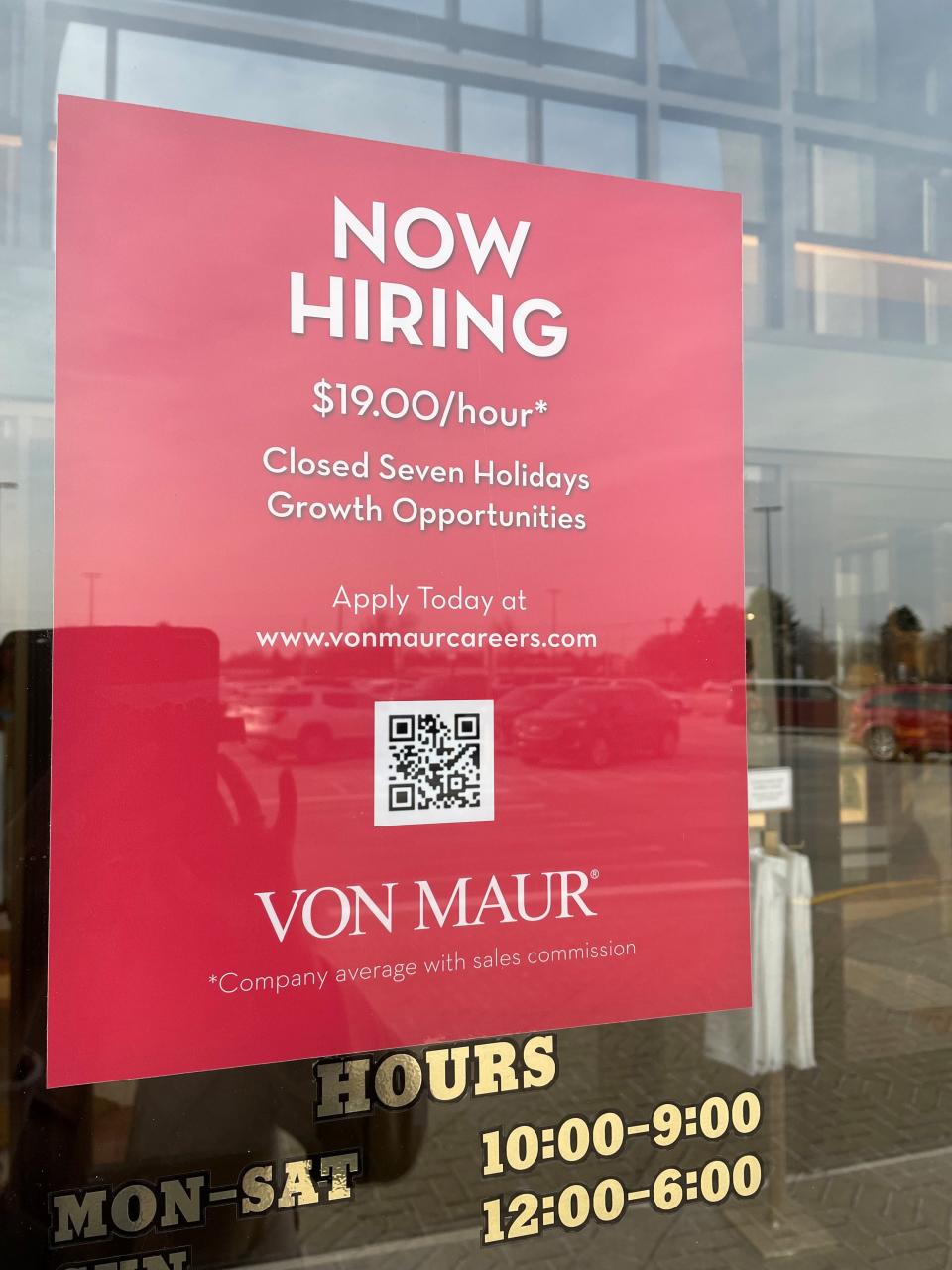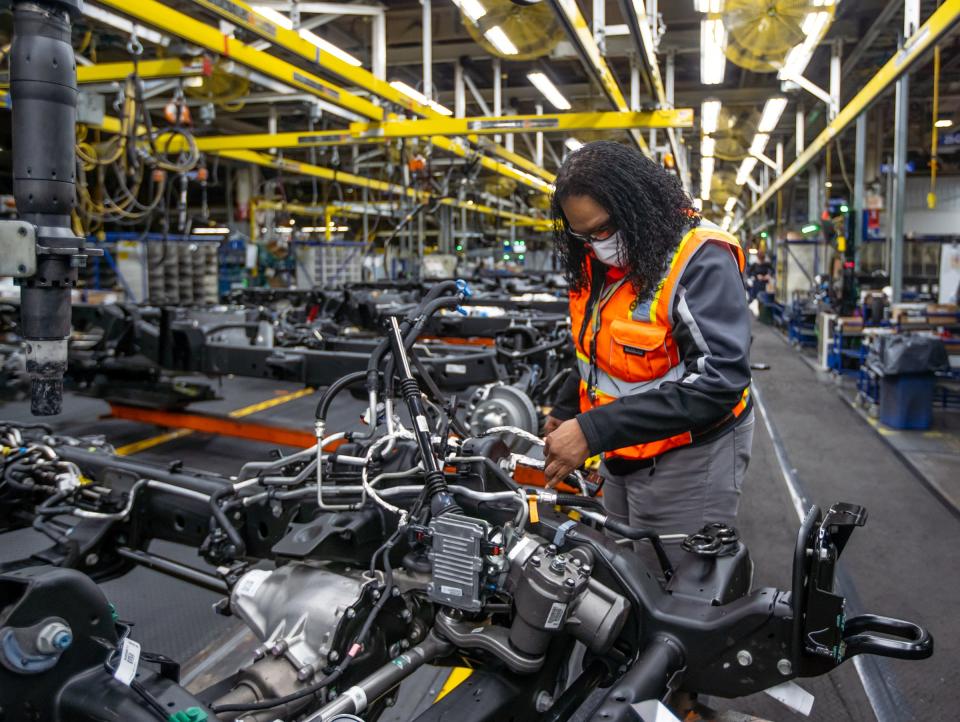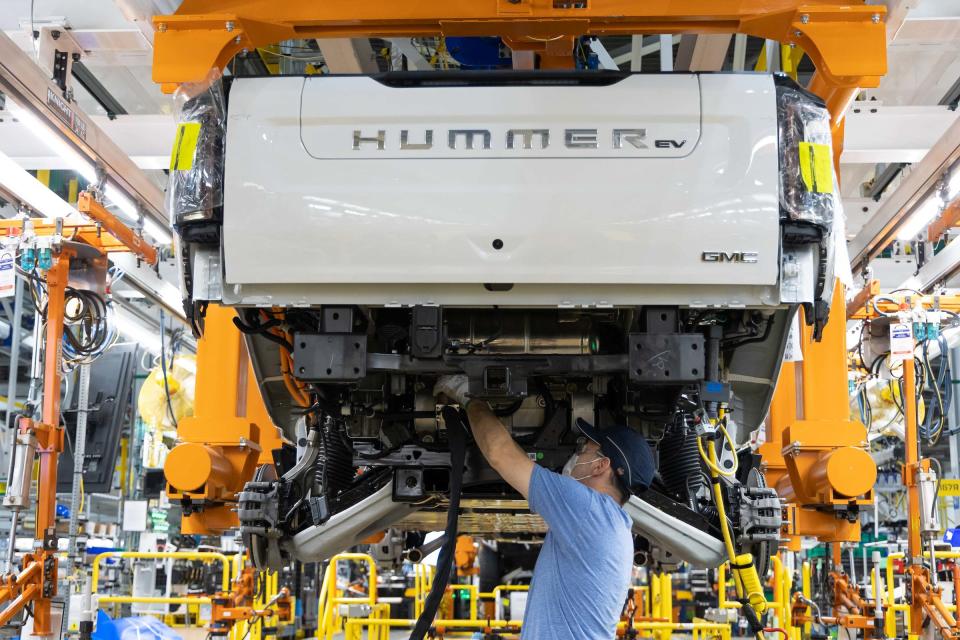Michigan auto industry struggles to hire, keep workers — with some quitting by lunch
Michigan's auto industry has its "hiring" signs out, but few are applying and some who do quit by lunchtime.
It is a nationwide problem that's hit small mom-and-pop suppliers and reverberated to the biggest carmakers in the world.
The challenge is serious enough that the Michigan Manufacturers Association has increased its budget and brought in a new director of workforce development to aggressively promote auto manufacturing jobs.

According to the Bureau of Labor Statistics, the number of people employed by motor vehicle and parts manufacturers declined by 3,500 in January. In February, the decrease was larger, with a decline of 18,000 jobs (both figures are on a seasonally adjusted basis).
By comparison, in February last year, the sector added nearly 4,000 jobs. The data is especially striking when considering that employment across all other sectors, even mining and logging, is growing. For example, last month, mining and logging companies added 9,000 jobs. In construction, 60,000 jobs were added.
During the fourth quarter last year, there were about 990,000 people employed in the motor vehicle and parts manufacturing sector, said Jason Miller, associate professor of logistics in Michigan State University's Department of Supply Chain Management. Miller's data comes from the Bureau of Labor Statistics.
Miller and other experts say the data does not reflect how many of the jobs lost might be due to layoffs, where the jobs still exist but are not active at the moment, or people who quit, leaving a job vacancy. But industry leaders say they are hiring and struggling to find and keep talent.
"The evidence is clear, the auto industry and its wages are not keeping pace with the new world so to speak," said Steve Melnyk a business professor at Michigan State University. "With the internet and job sites such as Monster and others, potential employees are looking at the total package and this total package does not look good for the auto industry."
He said low starting wages, lack of security initially and benefits factor into the equation. Auto industry employers are not only competing with each other for talent, they are competing with other industries that are strapped by the same labor shortages too, Melnyk said.
“It’s definitely a concern; it will definitely have an impact if the bleeding continues," said Carla Bailo, CEO of the Center for Automotive Research in Ann Arbor.
Part of the drop in employment is from the global shortage of semiconductor chips used in car parts. The shortage has disrupted production and led to layoffs.
But, Bailo said, the parts shortage has also been a blessing because the factories don't have enough employees to run full-out right now even if there were adequate parts available. Should the parts shortage be resolved, the labor shortage will be pronounced and problematic, Bailo warned.
"There is the secondary impact that you have to train these new workers," Bailo said. "If there are a lot of untrained workers on the line, that impacts vehicle quality. There’s an additional cost of having to get them trained and it’s a burden for the workers that are already there, so it’s a morale issue too."
Showing up to work
Factory work often requires long, odd hours, the work can be monotonous and it is physically taxing on the body.
"I’m a long-term thinker and I don’t know if long-term, these folks that are leaving, that it’s for a monetary reason altogether," said Jason Watson, shop chairman of UAW Local 2164, which represents hourly workers at GM's Bowling Green Assembly plant in Kentucky where GM makes the Corvette.

At Bowling Green, Watson said, some temps and a few new hires have quit after brief stints on the job this year. It has become common for GM to hire 10 temps and only six to eight show up for their first day on the job, he said.
Part of the problem is that new hires and low-seniority workers are assigned the 3 p.m. to 11:30 p.m. shift, called "second shift." Some just don’t want to do it, he said.
"Long term, this is not a bad gig, even for new hires," Watson said. "But the other things that come into play ... hours, monotony, the jobs are very physical and your body does take a toll ... drives them to leave."

Bailo said never underestimate the physicality of the work. She worked in a factory a few days a week while in college years ago and found she could "barely walk because my calves and legs were so sore."
Bailo said some auto industry companies have seen 100% turnover in their staff over the past year and they struggle to keep new hires.
"Those are smaller manufacturing companies on the west side of Michigan," Bailo said. "They say if someone starts in the morning and is still there after lunch, they’re happy.”
Ticket to middle class
The jobs have historically delivered high pay and good benefits, but in today's competitive market, where someone can start at Target at $15 to $24 an hour, the factory jobs don't hold the same allure they once did.
The UAW national contract with the Detroit Three defines the wages. New hires usually start off as temporary or "temp" earning $16.67 an hour. The idea of temps is not new, they've been around since the mid-1940s, usually as part of staffing agencies such as Kelly Services when office workers would fill in for permanent workers who took vacation or other time off. The Detroit automakers started relying on them in the 1960s and 1970s to cover high absenteeism on Mondays and Fridays as well as summer vacation times and other times when they needed staffing, said Harley Shaiken, professor emeritus at the University of California, Berkeley, who is an expert on labor issues. In the 2000s, temps started to have a broader presence in the factories, Shaiken said, because they were often a cost-saving measure for employers.
If and when workers are converted to permanent, the wage rises to $17 an hour or more depending on service time. It can rise to $28 an hour after eight years. A legacy worker, who is one hired before 2007, earns $28-$33 an hour.
But other industries and jobs offer high wages and benefits walking through the door, such as Von Maur department store in Livonia. It has signs on its doors that it is hiring at $19 an hour with seven holidays off and "growth opportunities."

"There was a time in the 1970s, when you had a high school education and walked into an auto plant, you entered the middle class," Shaiken said. "The turnover was high because it is tough work and you are tied to the line and it is endless. The absenteeism was high. But the appeal was immediate that day."
Now a person starting in a factory might be making less than someone working at Target or a fast-food chain, Shaiken said, so “people don’t see the middle class as real."
Shaiken said the drop in employment this year "is pretty remarkable," but there have been bigger dips in the past when automakers shut down plants or moved jobs out of the country.
Promoting plant work
Michigan Manufacturers Association CEO John Walsh said he believes the employment decline will be short-lived.
"I won’t go as far as to say there’s light at the end of the tunnel, but where I see hope is that applications for job openings have been increasing since the end of the year," Walsh said.
The Michigan Manufacturers Association represents about 1,800 manufacturers in industries that include auto, furniture and health care across the state. They range from small tool-and-die shops to the automakers.
Walsh said its automotive members "are having a hard time keeping people in the job. They could pay well, from $15 to $17, and be giving benefits immediately, but the person says they’d love to do it and then they don’t show up or are only in the job a short while."
On March 7, the association announced it hired Bill Rayl for a new job as executive director of workforce development. Rayl, who starts April 4, will connect members with training providers, community colleges and other resources to help auto companies recruit and learn ways to retain talent.
Rayl will also promote manufacturer jobs to elementary through high school-age students for the future workforce, Walsh said. The association raised its budget by 18% to promote the industry at colleges and job fairs. He declined to disclose a dollar amount for the budget.
Detroit 3's talent pool
General Motors has attracted new hires, but it has not been easy, especially in areas where there is low unemployment.
“GM is no different than any other U.S. employer at this time in terms of attracting talent in an environment where there is historically low unemployment across the country," GM spokesman David Barnas told the Detroit Free Press in an email.
Barnas said GM has had workers quit too, stating it has "experienced a slight uptick in turnover within our represented workforce."
But GM believes it offers the goods to get more workers by engaging employees in the company's operations and Barnas listed, "strong pay, excellent health care and other benefits, such as profit sharing, which is among the highest in the auto industry" as reasons for people to apply and stay once they're hired.
In 2021, about 42,500 U.S. hourly workers at GM were eligible to receive profit-sharing checks of up to $10,250 based on GM's yearly profits. Barnas said since 2015, eligible hourly employees have earned more than $72,000 each in profit-sharing. Ford Motor Co. and Stellantis also provide profit-sharing.
Ford spokeswoman Kelli Felker said, "While we are experiencing some of the same challenges as most businesses nationwide, we have been able to keep our plants staffed and running."
Felker did not further define what specific challenges Ford is experiencing or answer other detailed questions.
More: Ford UAW workforce to average $7,377 in profit-sharing checks
More: Stellantis UAW workforce eligible for $14,670 profit-sharing checks
Stellantis spokeswoman Jodi Tinson said the automaker has had "some" turnover at its plants, but she did not provide details.
"There are any number of reasons people may leave a job in a manufacturing facility and are likely the same across a number of industries," Tinson said. "These could include shift schedules, overtime, child care issues or the type of work."
She said Stellantis has also faced hiring challenges.
"With low unemployment rates across the country, we have had to work a bit harder to keep our pipelines full, but have been pleased with the response to recent hiring events," Tinson said.
To help in retention, Stellantis engages with its workforce, "recognizing employee contributions and helping them feel like they are sharing in the company's success," Tinson said.
Renegotiate union contract?
Still, it is in the best interest of the Detroit Three to raise hourly workers wages in the contract talks in October 2023, when the current UAW agreement expires, Shaiken said.
"The automakers are not judged on how high their wages are, they’re judged on high profitability," Shaiken said. "And that depends on high productivity, which comes from high wages."
The automakers could renegotiate a contract with the UAW ahead of next year's talks if they choose. But auto industry experts say reopening the contract would be complicated and require renegotiating more senior employees' pay beyond just entry level.
The UAW declined to comment, with spokesman Brian Rothenberg saying, "The UAW, as a policy, does not publicly discuss contractual matters that involve pre-, mid-, or post-bargaining discussions."
When asked whether GM would approach the UAW to renegotiate contract wage rates, Barnas would say only, “Any modifications to our labor agreement would require bargaining with our unions.”
Stellantis' Tinson said, "We are continuously analyzing market conditions related to pay and benefits, but decline any further comment."
Ford did not directly respond to the question.
The idea of reopening a contract is unusual, but not unprecedented.
Shaiken said in the early 1980s, then-UAW President Doug Fraser chose to reopen the contract about nine months before it expired. He was willing to give the company some critical wage concessions so the UAW could preserve jobs. There was another time in the early 1950s, when UAW President Walter Reuther had signed a five-year agreement, but then went back to automakers and said the contract was a living document and he wanted to reopen it to provide a better cost of living wage for workers to match inflation. But GM turned down Reuther's request to reopen it.
In 2009, the federal government mandated that GM and then-Chrysler reopen the 2007 contract to negotiate lower wages as the automakers went through bankruptcy proceedings.
"I suspect (automakers) will try to tough it out until the contract expires unless it gets really damaging to production," Shaiken said of today's situation. "They may have no choice … or they may extensively move people from temporary into permanent jobs faster.”
'Just gotta hang in'
GM is doing just that for 115 temporary workers at its Spring Hill Assembly plant in Tennessee.
On Monday, those workers were converted to permanent employees, said Danny Taylor, shop chairman of UAW Local 1853, which represents the hourly workforce at Spring Hill.
GM's Barnas confirmed the conversion, noting so far this year GM has hired more than 560 temporary employees to permanent status across its U.S. factories. Barnas said the conversion is part of GM's retention plan. It helps build long-term relationships with employees as GM trains them on the automotive, parts manufacturing and warehousing business.
"We also share with our team members the vision and goals of the company, along with their total compensation package both in terms of what it is today — and importantly — what it can grow into over time," Barnas said. "This communication is especially important given our track record of converting temporary employees to permanent status.”
But Taylor said in his plant, this conversion happened faster than the typical two years a person works as a temp because, "we’re short on people."
The plant is set to start building the 2023 Cadillac Lyriq EV on Monday, an important vehicle as GM moves to an all-electric lineup by 2035.
More: Cadillac to start production and orders for Lyriq, but parts shortage lingers

To fill plant jobs, GM first draws on workers from other plants who have transfer rights to move to Spring Hill. But “only 61” people from other plants signed up to relocate to Spring Hill, Taylor said. Hence, 115 temps were made permanent faster than usual.
The plant has had job fairs with "decent turnout," Taylor said. But hiring people as temps at $16.67 an hour is increasingly difficult, he said.
Taylor noted that some restaurants are giving signing bonuses just to come on board.
"Our attrition rate is not high," Taylor said, noting that turning 115 temps to permanent helps because, "the temps see there is a pathway to longevity at GM, you just got to to hang in there."
More: Michigan restaurants desperate to hire workers, offer incentives, but workers not biting
A $15,500 signing bonus
Some in the auto sector are getting more competitive and offering perks upfront.
Auto supplier Denso Manufacturing in Battle Creek has walk-in job interviews every Tuesday, it said on its website. Denso advertises jobs for advanced machine operators that pay "$20.60 with $1,800 sign-on bonus and $2,200 commitment bonus." An electrician can earn up to $33.75 and sign-on bonus up to $15,500.
Denso did not reply to a request seeking details on the job postings and pay.
Besides the competitive pay and bonuses, Denso tells applicants its jobs include:
Great benefits, plus 401(k) match
Consistent workweek: 40+ hours
13 paid holidays + 13 vacation days (prorated first year)
Maternity Leave
Secure and long-term employment
But not all auto businesses have the deep pockets to offer signing bonuses. .
Mike Copeland, owner of aftermarket performance company Diversified Creations in Brighton, said all his costs have gone up, making pay raises harder.
"My normal heat bill is $600 and now it’s $1,000 and we didn’t change anything," Copeland said.
To raise his entry wage from the current $15 an hour, he said, "the person that makes $35 an hour wants more too. So it’s not just that bottom person that you have to pay for.”
He has 10 employees and has openings for five more. Copeland has run ads on Indeed and ZipRecruiter where, pre-COVID-19, he would get 50 applicants.
"Now, I get one, maybe two," Copeland said. "We are a high-end shop and we build world-famous cars and work with TV shows. If you have a passion for cars, we’re the kind of shop you dream to be in — and I struggle to get people.”
Flint Assembly
High-end doesn't necessarily guarantee high rates of hiring or low turnover.
At GM’s Flint Assembly, where the popular and profitable Chevrolet Silverado and GMC Sierra heavy-duty pickups are built, 325 temps were converted to permanent employees last year, “so we’re good for now,” said Eric Welter, UAW Local 598 shop chairman at the plant.
But Welter worries about spring hiring and if he will get the "handful of people we need" considering the more competitive pay across all industries at the moment.

"It is a problem," Welter said. "I think corporate has to decide what fair market value is, not what the contract says, because if you don’t pay fair market value, you can’t bring in employees."
But he understands that trying to change the current contract ahead of next year's negotiations would be complex.
"It'll come down to if GM can continue to operate," Welter said.
At Flint, turnover has remained low among the permanent workforce, Welter said. When people do quit, the reasons aren't fully known since there are no official exit interviews.

"Some of it is the work. It’s shift work, so, 'I can’t work second shift,' " Welter said. "But that’s when the job is."
He said GM does offer informative training videos to show people what the work involves, but some people quit after they actually do the job and discover how hard it can be. Then, there is the monotony that gets to some.
"Everybody thinks it’s OK until they have to do it 348 times per shift," Welter said.
Factory Zero's fight
Factory ZERO in Detroit and Hamtramck is GM's newest and most technically advanced plant.
It will be GM's epicenter for EV production with the 2022 GMC Hummer EV pickup already rolling off the assembly line, a Hummer SUV to follow and eventually the 2024 Silverado EV pickup. The Silverado EV will also be made at Orion Assembly in Orion Township after GM expands that plant.

GM has said Factory ZERO will eventually employ 2,000 people. It now runs on a crew of 525 union-represented people, said Scott Harwick, shop chairman for UAW Local 22, which represents hourly workers in the plant.
The factory has half of the people needed in the body shop and paint shop, he said. But it's getting by because of the parts shortage limiting production. On Feb. 18, GM put out a notice that it was looking to transfer 350 hourly workers to Factory ZERO but then pulled back on Feb. 26 after deciding it did not need that many people yet, Harwick said.

But the plant will eventually ramp up production and need hundreds more workers.
"If we grow to a two-shift operation, we’ll be growing exponentially," Harwick said.
Some workers will be recalled after either being laid off in 2019 or transferred to other GM plants at that time. Last month, GM recalled about 90 people to Factory ZERO, Harwick said.
When the time comes to dramatically add to the ranks, Harwick has a suggestion: hire people off the street as permanent workers right away rather than as temps.
A permanent worker gets the immediate higher pay, the rich profit-sharing checks and 70% of their wages if they get laid off.
"That’s what I am going to be fighting for," Harwick said. "The company will want them as temps to keep costs down. But I heard that story about Target and $24 an hour and that’s incredible. How can you keep people if McDonald’s is paying $17 an hour? Our wages are our wages, we’re going off the national agreement, but it’s always being talked about because we need to retain people.”
Contact Jamie L. LaReau: 313-222-2149 or jlareau@freepress.com. Follow her on Twitter @jlareauan. Read more on General Motors and sign up for our autos newsletter. Become a subscriber.
This article originally appeared on Detroit Free Press: Michigan auto industry struggles to hire, keep workers

